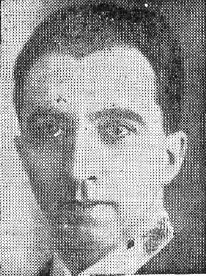José María Valiente Soriano
| José María Valiente Soriano | |
|---|---|
 |
|
| Born |
José María Valiente Soriano 1900 Chelva, Spain |
| Died | 1982 , Spain |
| Nationality | Spanish |
| Occupation | lawyer, politician |
| Known for | Politician |
| Political party | AP, CEDA, , , |
José María Valiente Soriano (Chelva, 1900 - , 1982) was a Spanish Carlist politician.
José María Valiente Soriano was born in the small Valencian town of Chelva to a petty bourgeoisie family; the son of José Valiente y Soriano and Micaela Soriano Alcaide, he had two sisters. His father was working as a notary; following his professional lot, the Valientes moved to Madrid during the last decades of the Restauración.
José María studied law first at the (later Universidad Complutense) in Madrid, to continue his juridical research with postgraduate doctoral thesis at the prestigious Università di Bologna (where he met Ramón Serrano Súñer, who was also studying jurisprudence). Valiente focused on the banking law and graduated cum laude in 1923. He commenced the career of a lawyer and an academic specialising in civil law at the faculty of law at the Universidad de Zaragoza, later to be also employed by the Universidad de Sevilla and the Universidad de la Laguna on the Canary Islands. Married to a Cantabrian aristocrat Consuelo Setién Rodríguez; the couple had three children.
In 1927 Valiente set up Juventud Católica de España, the ostensibly apolitical grouping concerned with defence and dissemination of Catholic values among the youth; in 1931 it was federated with Acción Católica, a broad organization of lay Catholics led by Ángel Herrera Oria. Later the same year, once the militantly secular course of the Republic began to take shape, he moved to politics by co-founding Acción Nacional (1932 to change its name to Acción Popular), a broad though heterogeneous conservative alliance, and became the vicepresident of its first National Committee. Since Acción Catolica banned its members from holding political party leadership roles Valiente had to resign from the JCE leadership.
...
Wikipedia
